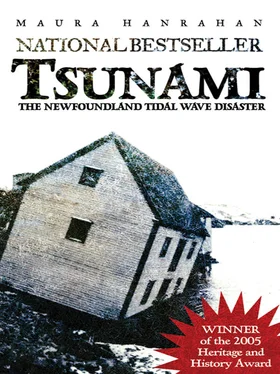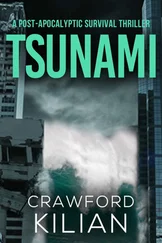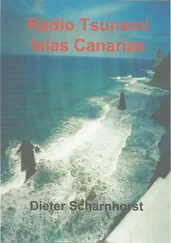As Hollett spoke of the wreckage in the immediate area, Dalton sank into the overstuffed leather chair. He fixed his eyes on the intensity on the magistrate’s face. These were Hollett’s people, he realized—his family, friends, and neighbours.
The Meigle departed Burin on November 27 and dispatched the members of the relief expedition at Argentia at nine o’clock in the morning, where they caught the train. They were in St. John’s a few hours later, rushing to the prime minister’s office.
Squires was almost silent as he listened to Mosdell’s account of the destruction the tidal wave had wrought.
“The property losses are heaviest at St. Lawrence,” the doctor said.
The prime minister nodded.
“It’s to be expected, I suppose,” Mosdell continued. “It being the largest town on the boot.”
“Hollett keeps writing me,” Squires said slowly. “About the loss of life in particular. It’s greater than first thought, I’ve learned.”
“Twenty-seven,” Campbell said. “That’s the most accurate figure. Almost all women and children.”
Squires walked slowly around his large desk. The only sound in the room was his assistant’s breathing.
From behind his desk, the prime minister seemed to return to himself.
“There may be a solution at hand—to the damage, I mean,” he announced. “A South Coast Disaster Committee, under the governor’s patronage, was formed at a public meeting two nights ago. I’m the honorary president and Horwood is acting as chair. Hollett suggested a public subscription. A good idea. But the people were ahead of him—as I knew they would be.” He smiled; his colleagues smiled back in recognition of Squires’ trademark expression.
“They’ve begun house to house collections all over the city,” he continued. “And benefit concerts are being arranged.”
Mosdell nodded.
“The Evening Telegram has opened a public subscription as well,” he added. “That family has got to get in on everything. Hmmph! Well, they’ve got ten thousand dollars together for us in just a few days. According to what Hollett says and what you tell me, we’ll need every cent. All these public donations take pressure off the government. We’ll need the help after the true impact of the New York stock market crash begins to be felt.”
The other men said nothing for a few minutes. Then Campbell spoke up. “I’m sure other towns in the country will open their hearts and pocketbooks as well,” he said.
“Oh indeed!” Squires responded enthusiastically. “They’ve set up a subcommittee on outport contact. I’ve been told to expect large contributions from Grand Falls and Corner Brook in particular, where the paper mills are located.”
As Minister of Marine and Fisheries, Lake’s thoughts drifted to the hundreds of fishing villages on the northeast and west coast. He knew they were filled with people who would want to help but, like their counterparts on the south coast, cash was not important in their lives—fish was their currency.
“Is there a way for people to give non-cash gifts?” he asked.
“Oh yes,” Squires said. “A Kinds Committee has been set up to receive food and clothing and these have begun pouring in already. Harveys Ltd. has donated warehouse space near the railway station where everything can be stored before it’s sent to the Burin Peninsula.”
Lake’s mind harkened back to the snow and wind that had slowed the Meigle ’s voyage along the coast.
“What are the plans for getting donations to the South Coast?” he asked. “And distributing them?”
“Hollett has stepped up to the plate,” Squires answered confidently. “We’ve appointed him the committee’s agent. He’ll settle the claims in a just and expedient manner.”
“It’ll be a massive job,” Lake said gravely. “He’ll need every support.” The other members of the relief expedition nodded and murmured “yes.”
“It’s a great relief that almost no breadwinners were killed,” Squires said, looking out the window now.
“It is, sir,” Mosdell said. “But it is an extremely serious situation all the same because hundreds of fishermen are in no position to earn a living this coming fishing season.”
“Literally thousands of fishing outbuildings are destroyed, completely flattened,” Lake added. “It is no easy task to rebuild them, especially in winter and without easy access to lumber.”
“Quite a few of them are grief-stricken, too,” Campbell said. “Having lost relatives, wives even, to the tidal wave.”
Squires turned away from the window and nodded. For a moment, a white cast returned to his face. Then he said, “That may be so. But our people are tough and resourceful, especially those in the outports. And the committee will give them the means to rebuild. I have great faith that everything is in hand.”
He glanced around the ornate room.
“I thank you all, gentlemen, for the service you have rendered to our country as members of the relief expedition.”
Mosdell had been about to ask Squires about further assistance from the Newfoundland government, but the prime minister had already disappeared from his office and was dashing down the hallway.
Some of the tension in Magistrate Hollett’s shoulders was finally released when he received news that the South Coast Disaster Committee had been formed and had begun receiving public donations from all over the country. His heart leapt when he heard that money had begun to trickle in from the United States, Canada, and England as well. It was all badly needed, he knew, and he would make sure it would be put to good use.
One of the villages Hollett was most concerned about was Port au Bras, another peninsula community with French roots. Migratory fishermen from St. Malo, France, christened the village “port of arms,” which might have been an indication of the sporadic ethnic conflicts over cod that marked Newfoundland history. By the late 1700s, both English and French settlers had made Port au Bras their permanent home, living in a collection of houses that seemed to tumble onto the rocks and almost into the sea. By 1900, three hundred people lived in the village. Known for its skilled fishing captains and masters of foreign-going trading vessels, there was something of the invincible about Port au Bras.
That ended on the night of November 18, as Port au Bras native Ern Cheeseman wrote in a letter to his brother, Jack:
Monday evening at 5.20 we had an earth tremor, all the houses and the ground shook for about 5 minutes. This put everyone in a panic. Women screamed and prayed and we stood silent and scared but we were just trying and had finally succeeded in quieting the women when we had a tidal wave of the worst kind. Enormous waves twenty feet high swept into the harbour…
Charlie Clarke’s store went first, taking Henry Dibbon’s with it into the Pond, taking everything as it came with a thunderous roar. It swept around by Ambrose’s up to Jack Bennett’s out our way bringing all the stores and houses that stood in its way. Then all the boats went mad (and) came in.
The harbour was cleaned (by) the first wave. Then the second one came and brought it all in again. Such noise and scrunching you never heard.
By this time we had all fled to the hills, the highest places we could find. From there we watched the third wave come and go. You could hear the poor humans who were caught, screaming women and men praying out loud. Oh God, Jack, it was terrible…
Fifty-three-year-old Tom Fudge had been in his stores with his two sons, John and Job, when the ground began to tremble. John, just entering his twenties, laughed at the unexpected sensation. Job, at thirteen, blanched and looked to his father for words of comfort.
Читать дальше












